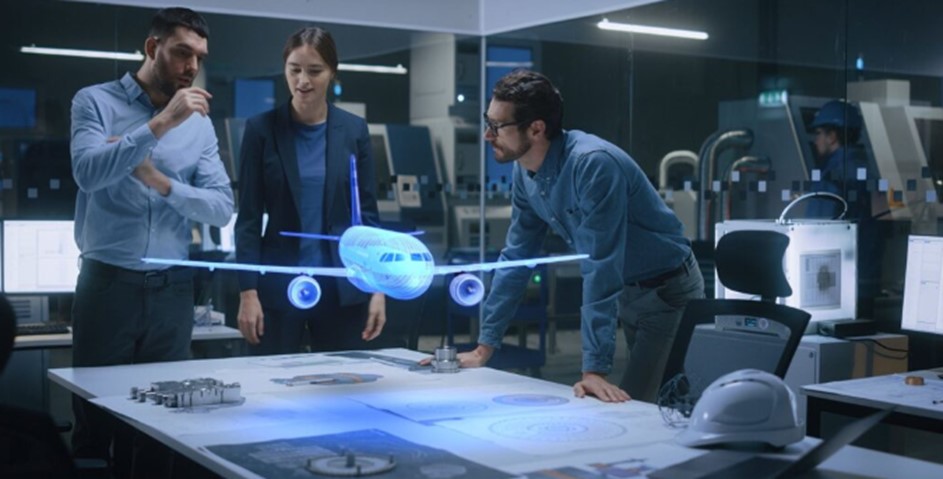Digital transformation and the digital thread spike innovation for the A&D industry

As we celebrate World Space Week and the benefits to science and technology, the aerospace and defense (A&D) industry is poised for rapid growth and innovation. Despite the global pandemic which disrupted supply chains and fuel supplies, today’s aircraft manufacturers are investing in engine and vehicle design for improved performance and efficiency, such as lower fuel consumption, operating costs and lower or zero-emissions for a sustainable future.
Investments in commercial and defense aircraft have risen with the prospect of increased consumer travel in 2024, and the need for advanced technologies such as cybersecurity and respectively, electronic warfare to modernize aircraft for military use with the threats in China, Russia and North Korea. Likewise, the “race to space” from billionaires Branson, Bezos and Musk has received global media attention, and advanced air mobility (AAM) initiatives have led to the development of electric vertical takeoff and landing (eVTOL) aircraft. According to a recent survey by Deloitte, the global professional services and consultancy, 88 percent of the senior executive respondents forecast a “very positive” outlook for the industry in the coming years. Their reasonings for growth include new technologies such as AAM, opportunities for new A&D business models, and the focus on innovation and digitalization such as the digital twin and smart factories.
Siemens Digital Industries Software is focused on digital transformation and the A&D trends and outlook reflect the increased investment in software and services by its customers. A recent report by CIMdata, the leading independent global strategic management consulting and research authority, focused exclusively on PLM and the digital transformation, supports Deloitte’s survey across global A&D companies. CIMdata’s Aerospace & Defense PLM Action Group conducted the Digital Thread in Aerospace and Defense study with aerospace OEMs and aircraft engine manufacturers in 2023, sponsored by Siemens Digital Industries Software. The report reveals increased investments in digitalization technologies such as the digital twin and digital threads to connect multi-domain engineering disciplines for the traceability of data across the product lifecycles of those companies surveyed. Digital transformation enables engineers to connect data and conduct multiple capabilities across disparate engineering teams to speed product development with more reliability. The digital twin, developed with robust software design, simulation and verification tools, provides a virtual representation of a physical product which serves as a “single source of truth,” allowing engineers in specialized roles (electrical, mechanical, electronic, software, for example) to review and provide respective design changes that interact with the entire product or system. Digital threads provide automated links of various representations of the product for meaningful connections between the product’s digital assets across these multiple domains in the lifecycle. As a result, increased data traceability dramatically reduces the time required for the engineers to process data. With digital transformation and automated digital threads and the digital twin to validate optimal design performance, replacing mundane, manual tasks, engineers can now focus on actual engineering innovation with reliability, advancing new products for the A&D industry. To access the free CIMdata report, click this link: Aerospace Digital Thread | Aerospace PLM | Siemens
Siemens Digital Industries Software A&D Industry vice president, Todd Tuthill, foresees high investments for both commercial and defense aerospace spending over the next five years. The future of innovation for sustainable aviation and space exploration appears to be healthy and prosperous, with digitalization as a key enabler for engineering innovation. Tuthill was recently interviewed for a podcast on the criticality of digitalization for the A&D industry, with one key issue impacting manufacturers: the global shortage of aerospace engineers. This has been a trend for many years as the demand for A&D talent is increasing – roughly tens of thousands of engineers are needed today. Also, increasing numbers of older engineers are retiring and the COVID-19 global pandemic also impacted the A&D workforce. By 2030, about 20 percent of all engineering positions will remain unfilled, according to Tuthill from industry analysts. Thus, finding a solution to overcome the engineering shortage is paramount.
Tuthill points to digitalization and software, particularly data management, as a viable solution to the shortage of aerospace engineers. As a former aerospace engineering executive, Tuthill states that most engineers are not performing actual engineering – instead, they are spending their majority of time searching for and processing data. These mundane tasks are due to increasing product design complexity which requires integrating several complex systems from different engineering domains that have been disconnected, due to manual and slow document-based development processes. Today’s advanced, intuitive and easy-to-use software tools and methodologies can compensate for the shortage of engineers, automating processes to combine the real and virtual worlds with a comprehensive digital twin. As A&D companies adopt digitalization across their organization, engineering teams can focus on innovation and create new and dynamic products for a sustainable future. Siemens Xcelerator software accelerates digital transformation so engineering teams can create the most comprehensive digital twin with Siemens software portfolio combining the real and digital worlds for leading A&D companies.
To hear Tuthill’s podcast interview, click this link: “Maturing Your Digital Transformation” (Ep. #1): The Need for a Digitalized A&D Industry | Talking Aerospace Today.